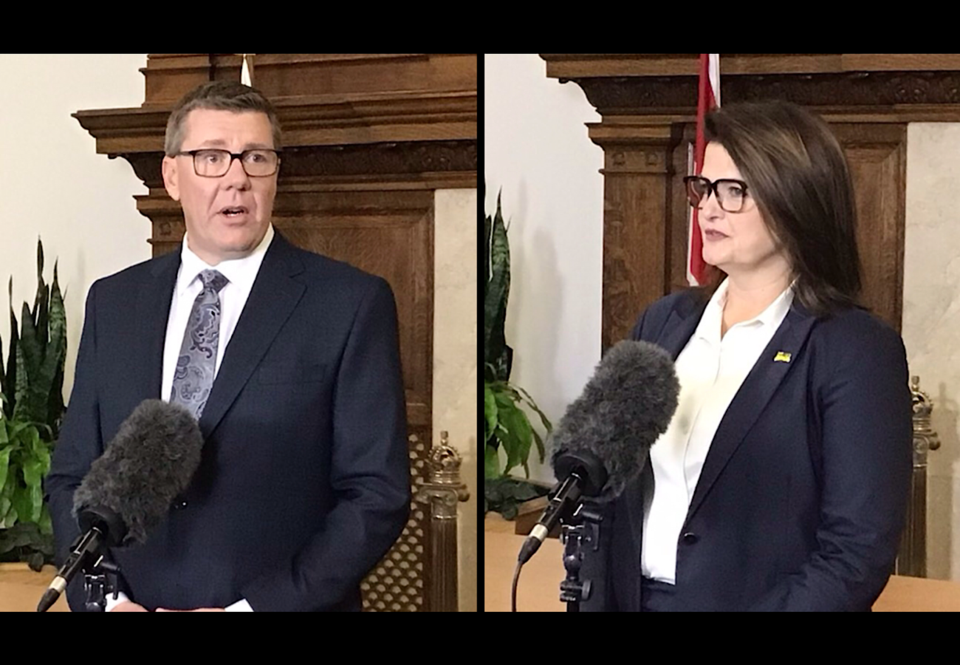REGINA - The two major party leaders are back on the campaign trail following Wednesday’s leaders’ debate, but it’s hard to tell if the debate made a difference.
Scott Moe and Carla Beck took part in a one hour debate held at the rotunda of the Legislative Assembly. It was a debate in which both leaders kept it civil for the most part in laying out their policies, while taking the other side to task for their platform and their records.
When asked by reporters what he thought of his performance, Moe replied it wasn’t about how he felt about it.
“What the debates are about, is providing an explanation of the platforms that the respective parties have to the Saskatchewan people. That is the goal of the debate. I think if that can happen, they are the winners. They can better understand the platforms that are put forward by their respective parties, in this case the two parties that the polling says can form government. So I would say if there is a winner tonight, that would be Saskatchewan people because they have a better opportunity to understand the platforms that the Saskatchewan party and the NDP are putting forward.”
When asked for her reaction, Carla Beck said she was “excited to come out tonight and talk about our plan, to talk about our platform, and to talk about the things and places in this province that I think the people in this province deserve better: the cost of living, healthcare, education, crime. I think there’s always one or two (answers) you are going to think about which will keep you up at night and wish you’d come up with a different answer, but all in all, I was proud to present our plan and the Saskatchewan people will have a choice.”
On the X platform, the NDP put out a post that was quick to claim victory. “It’s official! Carla Beck won the debate. It’s time for change to get Saskatchewan out of last place!”
The responses to that post on X, however, told a different story, with several disputing that assessment.
“If she is the best the NDP can do for a leader the Saskatchewan Party has nothing to worry about,” was one response. Another said: “Not a slam dunk for the NDP. Carla looked uncomfortable. Scott was arrogant as always."
Tom McIntosh, Professor of Politics and International Studies at the University of Regina, did not think the debate made a big difference as far as the campaign is concerned.
“I don’t think it moved the needle at all in part, because my initial reaction on Twitter last night was it was a format designed to sort of stop all debate,” said McIntosh.
“They never really got to debate each other, which was what debates used to be able to do. It was structured in a way that both leaders really stuck to their talking points. It allowed them to stick to their talking points and was very difficult to push them off of it. There were a couple of exchanges, a couple of interruptions on both sides, but there was no big knockout punch. There was no sort of turning point in the debate.”
The classic example of what he was referring to was the big moment in the federal debate in 1984 when Brian Mulroney turned to John Turner, and said “you had an option” about making patronage appointments he did on behalf of the former Prime Minister Pierre Trudeau.
“And you could just see on television, the blood draining from John Turner’s face,” said McIntosh.
“That was a pivotal moment in a debate. It exposed the weakness in Turner’s campaign. There was nothing like that here. But it’s pretty much what debates are like right now. They’re highly structured, because the candidates don’t necessarily want to go into a more free-for-all kind of back-and-forth with each other.”
McIntosh thought the big thing for leaders in debates these days are: “don’t make a mistake, and don’t get off message at any point. And so I found the structure of the debate allowed them to very much stay on message about where they see their campaign and where they see their opposition. So yeah, debates are sort of a compulsory figure, if you will, in a campaign, but it seems the big thing is to minimize any potential negative impact."



